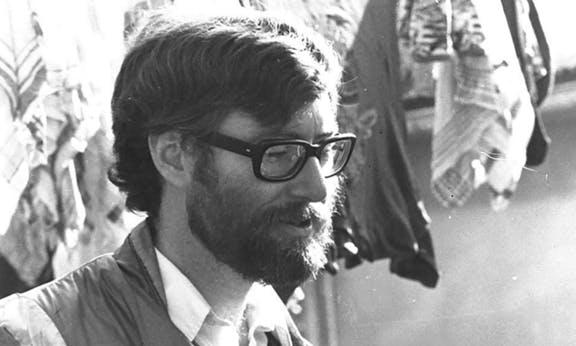The politics of patience

Tom O’Lincoln will be known to many for his historical writings. But Tom is also a lifelong political activist. Now, turning 70 and facing health problems, he has written an autobiography, The Highway is for Gamblers. For some on the left, an autobiography is an opportunity for self-justification, for settling old scores. Tom’s account is self-critical and generous to comrades who have chosen a different path from his.
Born in the USA, Tom first became involved with politics during the famous Berkeley Free Speech Movement. Faced with the political ferment in US society produced by the Vietnam War, he found himself “sampling the political smorgasbord on offer in Berkeley” in 1968-69. Eventually, he joined the International Socialists. Like so many of us around the world, he was impressed by Hal Draper’s pamphlet The Two Souls of Socialism with its advocacy of “socialism from below”.
After some travel in Europe, he moved to Australia, where he has spent the rest of his life. He has lived through a stormy half-century, and has been fortunate enough to travel to some of the most exciting locations. Portugal in 1975 was one of those brief moments when, in Orwell’s phrase “the working class was in the saddle”.
He recalls: “The factory occupations were of course an attraction for us. We international activists had the striking experience of chatting with insurgent Portuguese workers in board rooms”. Nicaragua in 1985, after the fall of Somoza, offered a more problematic prospect. As Tom noted:
“The government was in line with Western-style parliamentarism. Unlike the 1917 Soviet regime, there were no workers’ councils through which the proletariat exercised power. This parliamentary system represented a huge step forward for people previously oppressed by a dictator. But it had no specifically socialist character.”
This is not gloating or boasting a superior analysis, simply observing processes which, sadly, ended in defeat.
Tom is not one of those – all too common on the English-speaking left – who say: “I am an intransigent internationalist, but I can’t be bothered getting this silly foreigner’s name right”. He is a remarkably gifted linguist and translator. In 1993, he was well past the age when the acquisition of languages is easy, but he observed that “things were happening politically” in Indonesia and decided to learn the language, using a regular tram journey for his initial practice. Eventually, he was sufficiently proficient to be involved in launching “the first-ever Marxist website in the Indonesian language”.
Though he was able to observe some of the revolutionary high spots of his lifetime, Tom spent most of his time on the more mundane task of building a revolutionary organisation in Australia. With a handful of comrades, Tom helped to set up the self-deprecatingly named Socialist Workers’ Action Group – SWAG, which grew into the Australian International Socialists.
By 1976, the organisation was big enough to play a significant role in the campaign to defend the Medibank health insurance scheme. When the union machine merely called for a four-hour strike, the IS “demanded a twenty-four hour stoppage, and called for weekly stoppages in every state as a move towards generalised national strike action”.
Subsequently, “the IS rushed out leaflets overnight to the doorsteps of key shop stewards – a network we had established through our ‘workers’ paper’ project. Partly because of this agitation, telephone calls began to pour into union offices. By the time the stoppage took place on 16 June, the left union leaders had recognised that they risked being outbid by the tiny forces of the revolutionary left. They made an abrupt left turn”.
But, as elsewhere, the left soon had to face up to a “downturn” in struggle; by 1983 there was a “historic collapse of industrial militancy”. For the International Socialists the result, almost inevitably, was factional disputes and a split. The minutiae of the evolution of the Australian far left will be of interest only to a limited audience, but Tom has some interesting thoughts on what he calls the “politics of impatience”, which may have parallels in other countries. Tom’s comrade Rick Kuhn summarised Tom’s analysis:
“As the levels of social struggle declined, a majority of the leadership of the IS had become impatient with the group’s membership and the world outside. The result was voluntarism; attempts to substitute the organisation’s determination for the inadequacies of the real world: intolerance of internal disagreement and anything less than the very high level of activity expected of members, a sectarian attitude to serious movements and others involved in them; and a predilection for self-generated campaigns that drew in very few other people.”
Tom sums up the paradox of impatience:
“On the one hand, all of us need a healthy dose of it – we need to grasp the moment and do what we can, with whatever resources we have, to make the most of any opportunity. On the other hand, there is always a temptation to bridge by force of will the gap between the meagre forces of the revolutionary left and the ultimate end we desire.”
Eventually, Tom left the International Socialist Organisation and joined Socialist Alternative, of which he remains an active member. This beautifully produced book (described by editor Janey Stone as “a scrapbook – a collection of stories, vignettes, anecdotes, jottings, photos, ephemera”) is illustrated with photographs, leaflets and press cuttings, and is full of information and insights that will be rewarding even to those of us who know relatively little about Australia.
This is not just the portrait of a remarkably interesting individual, it is the portrait of an age so many of us have lived through.